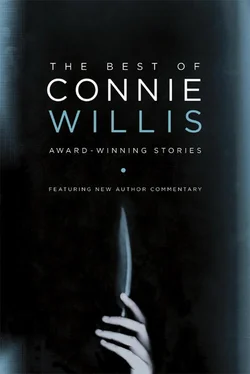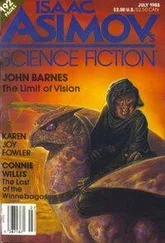“Jake says the great outdoors is our home,” she said. I gave up trying to get a picture of her and snapped a few high-quality detail stills for the papers: the “Pilot” sign taped on the dashboard in front of the driver’s seat, the crocheted granny-square afghan on the uncomfortable-looking couch, a row of salt and pepper shakers in the back windows—Indian children, black Scottie dogs, ears of corn.
“Sometimes we live on the open prairies and sometimes on the seashore,” she said.
She went over to the sink and hand-pumped a scant two cups of water into a little pan and set it on the two-burner stove. She took down two turquoise Melmac cups and matching saucers and a jar of freeze-dried coffee and spooned a little into the cups.
“Last year we were in the Colorado Rockies. We can have a house on a lake or in the desert, and when we get tired of it, we just move on. Oh, my, the things we’ve seen.”
I didn’t believe her. Colorado had been one of the first states to ban recreation vehicles, even before the gas crunch and the multiways. It had banned them on the passes first and then shut them out of the national forests, and by the time I left they weren’t even allowed on the interstates.
Ramirez had said RVs were banned outright in forty-six states. New Mexico was one, Utah had heavy restricks, and daytime travel was forbidden in all the western states. Whatever they’d seen, and it sure as hell wasn’t Colorado, they had seen it in the dark or on some unpatrolled multiway, going like sixty to outrun the cameras. Not exactly the footloose and fancy-free life they tried to paint.
The water boiled. Mrs. Ambler poured it into the cups, spilling a little on the turquoise saucers. She blotted it up with the dish towel. “We came down here because of the snow. They get winter so early in Colorado.”
“I know,” I said.
It had snowed two feet, and it was only the middle of September. Nobody even had their snow tires on. The aspens hadn’t even turned yet, and some of the branches had broken under the weight of the snow. Katie’s nose had still been sunburned from the summer.
“Where did you come from just now?” I asked Mrs. Ambler.
“Globe,” she said, and opened the door to yell to her husband. “Jake! Coffee!” She carried the cups to the table-that-converts-into-a-bed. “It has leaves that you can put in it so it seats six,” she said.
I sat down at the table so she was on the side where the eisenstadt could catch her. The sun was coming in through the cranked-open back windows, already hot. Mrs. Ambler got onto her knees on the plaid cushions and let down a woven cloth shade, carefully, so it wouldn’t knock the salt and pepper shakers off.
There were some snapshots stuck up between the ceramic ears of corn. I picked one up. It was a square Polaroid from the days when you had to peel off the print and glue it to a stiff card. The two of them, looking exactly the way they did now, with that friendly, impenetrable camera smile, were standing in front of a blur of orange rock—the Grand Canyon? Zion? Monument Valley? Polaroid had always chosen color over definition. Mrs. Ambler was holding a little yellow blur in her arms that could have been a cat but wasn’t.
It was a dog.
“That’s Jake and me at Devil’s Tower,” she said, taking the picture away from me. “And Taco. You can’t tell from this picture, but she was the cutest little thing. A chihuahua.”
She handed it back to me and rummaged behind the salt and pepper shakers. “Sweetest little dog you ever saw. This will give you a better idea.”
The picture she handed me was considerably better, a matte print done with a decent camera. Mrs. Ambler was holding the chihuahua in this one, too, standing in front of the Winnebago.
“She used to sit on the arm of Jake’s chair while he drove and when we came to a red light she’d look at it, and when it turned green she’d bark to tell him to go. She was the smartest little thing.”
I looked at the dog’s flaring, pointed ears, its bulging eyes and rat’s snout.
The dogs never come through. I took dozens of pictures, there at the end, and they might as well have been calendar shots. Nothing of the real dog at all. I decided it was the lack of muscles in their faces—they could not smile, in spite of what their owners claimed.
It is the muscles in the face that make people leap across the years in pictures. The expressions on dogs’ faces were what breeding had fastened on them—the gloomy bloodhound, the alert collie, the rakish mutt—and anything else was wishful thinking on the part of the doting master, who would also swear that a color-blind chihuahua with a brain pan the size of a Mexican jumping bean could tell when the light changed.
My theory of the facial muscles doesn’t really hold water, of course. Cats can’t smile, either, and they come through. Smugness, slyness, disdain—all of those expressions come through beautifully, and they don’t have any muscles in their faces, either, so maybe it’s love that you can’t capture in a picture because love was the only expression dogs were capable of.
I was still looking at the picture. “She is a cute little thing,” I said and handed it back to her. “She wasn’t very big, was she?”
“I could carry Taco in my jacket pocket. We didn’t name her Taco. We got her from a man in California that named her that,” she said, as if she could see herself that the dog didn’t come through in the picture. As if, had she named the dog herself, it would have been different. Then the name would have been a more real name, and Taco would have, by default, become more real as well. As if a name could convey what the picture didn’t—all the things the little dog did and was and meant to her.
Names don’t do it, either, of course. I had named Aberfan myself. The vet’s assistant, when he heard it, typed it in as Abraham.
“Age?” he had said calmly, even though he had no business typing all this into a computer, he should have been in the operating room with the vet.
“You’ve got that in there, damn it!” I shouted.
He looked calmly puzzled. “I don’t show any Abraham…”
“Aberfan, damn it. Aberfan!”
“Here it is,” the assistant said imperturbably.
Katie, standing across the desk from me, glanced up from looking at the screen. “He had the newparvo and lived through it?” she said, and her face was wide open.
“He had the newparvo and lived through it,” I said, “until you came along.”
“I had an Australian shepherd,” I told Mrs. Ambler.
Jake came into the Winnebago, carrying the plastic bucket. “Well, it’s about time,” Mrs. Ambler said. “Your coffee’s getting cold.”
“I was just going to finish washing off Winnie,” he said. He wedged the bucket into the tiny sink and began pumping vigorously with the heel of his hand. “She got mighty dusty coming down through all that sand.”
“I was telling Mr. McCombe here about Taco,” she said, getting up and taking him the cup and saucer. “Here, drink your coffee before it gets cold.”
“I’ll be in in a minute,” he said. He stopped pumping and tugged the bucket out of the sink.
“Mr. McCombe had a dog,” she said, still holding the cup out to him. “He had an Australian shepherd. I was telling him about Taco.”
“He’s not interested in that,” Jake said. They exchanged one of those warning looks that married couples are so good at. “Tell him about the Winnebago. That’s what he’s here for.”
Jake went back outside. I screwed the longshot’s lens cap on and put the vidcam back in its case. She took the little pan off the miniature stove and poured the coffee back into it. “I think I’ve got all the pictures I need,” I said to her back.
Читать дальше












